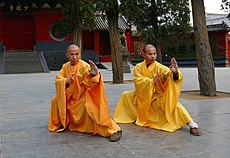
Back Artes marciales internes AST Innere Kampfkünste German Neijia Spanish Art martial interne French Siming Neijiaquan Italian 内家拳 Japanese 내가권 Korean Neijia Portuguese Neijia Romanian Neijia SIMPLE
| Neijia | |||||||||||||||||
|---|---|---|---|---|---|---|---|---|---|---|---|---|---|---|---|---|---|
| Chinese | 內家 | ||||||||||||||||
| Hanyu Pinyin | nèi jiā | ||||||||||||||||
| Literal meaning | internal family | ||||||||||||||||
| |||||||||||||||||
| Wudangquan | |||||||||||
|---|---|---|---|---|---|---|---|---|---|---|---|
| Traditional Chinese | 武當拳 | ||||||||||
| Hanyu Pinyin | wǔ dāng quán | ||||||||||
| |||||||||||
| Part of a series on |
| Chinese martial arts (Wushu) |
|---|
 |
Neijia (內家) is the collective name for the internal Chinese martial arts.[1] It relates to those martial arts occupied with spiritual, mental or qi-related aspects, as opposed to an "external" approach focused on physiological aspects. The distinction dates to the 17th century, but its modern application is due to publications by Sun Lutang, dating to the period of 1915 to 1928. Neijin is developed by using neigong or "internal changes", contrasted with waigong (外功; wàigōng) or "external exercises" .
Wudangquan is a more specific grouping of internal martial arts named for their association in popular Chinese legend with the Taoist monasteries of the Wudang Mountains in Hubei province. These styles were enumerated by Sun Lutang as tai chi, xingyiquan and baguazhang, but most also include bajiquan and the legendary Wudang Sword.
Some other Chinese arts, not in the wudang quan group, such as qigong, liuhebafa, Bak Mei Pai, ziranmen (Nature Boxing), Bok Foo Pai and yiquan are frequently classified (or classify themselves) as "internal".
- ^ Mitchell, Damo (2014). Daoist Nei Gong: The Philosophical Art of Change. Singing Dragon. p. 213. ISBN 978-1-84819-065-8.
© MMXXIII Rich X Search. We shall prevail. All rights reserved. Rich X Search